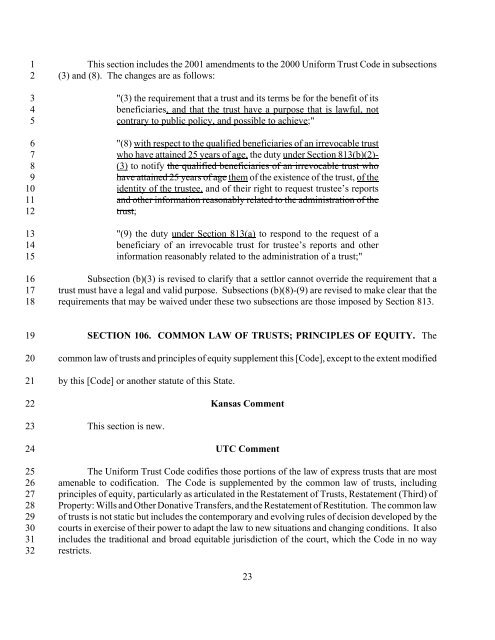uniform trust code - Kansas Judicial Branch
uniform trust code - Kansas Judicial Branch
uniform trust code - Kansas Judicial Branch
You also want an ePaper? Increase the reach of your titles
YUMPU automatically turns print PDFs into web optimized ePapers that Google loves.
1<br />
2<br />
3<br />
4<br />
5<br />
6<br />
7<br />
8<br />
9<br />
10<br />
11<br />
12<br />
13<br />
14<br />
15<br />
16<br />
17<br />
18<br />
This section includes the 2001 amendments to the 2000 Uniform Trust Code in subsections<br />
(3) and (8). The changes are as follows:<br />
"(3) the requirement that a <strong>trust</strong> and its terms be for the benefit of its<br />
beneficiaries, and that the <strong>trust</strong> have a purpose that is lawful, not<br />
contrary to public policy, and possible to achieve;"<br />
"(8) with respect to the qualified beneficiaries of an irrevocable <strong>trust</strong><br />
who have attained 25 years of age, the duty under Section 813(b)(2)-<br />
(3) to notify the qualified beneficiaries of an irrevocable <strong>trust</strong> who<br />
have attained 25 years of age them of the existence of the <strong>trust</strong>, of the<br />
identity of the <strong>trust</strong>ee, and of their right to request <strong>trust</strong>ee’s reports<br />
and other information reasonably related to the administration of the<br />
<strong>trust</strong>;<br />
"(9) the duty under Section 813(a) to respond to the request of a<br />
beneficiary of an irrevocable <strong>trust</strong> for <strong>trust</strong>ee’s reports and other<br />
information reasonably related to the administration of a <strong>trust</strong>;"<br />
Subsection (b)(3) is revised to clarify that a settlor cannot override the requirement that a<br />
<strong>trust</strong> must have a legal and valid purpose. Subsections (b)(8)-(9) are revised to make clear that the<br />
requirements that may be waived under these two subsections are those imposed by Section 813.<br />
19<br />
20<br />
21<br />
22<br />
23<br />
24<br />
25<br />
26<br />
27<br />
28<br />
29<br />
30<br />
31<br />
32<br />
SECTION 106. COMMON LAW OF TRUSTS; PRINCIPLES OF EQUITY. The<br />
common law of <strong>trust</strong>s and principles of equity supplement this [Code], except to the extent modified<br />
by this [Code] or another statute of this State.<br />
<strong>Kansas</strong> Comment<br />
This section is new.<br />
UTC Comment<br />
The Uniform Trust Code codifies those portions of the law of express <strong>trust</strong>s that are most<br />
amenable to codification. The Code is supplemented by the common law of <strong>trust</strong>s, including<br />
principles of equity, particularly as articulated in the Restatement of Trusts, Restatement (Third) of<br />
Property: Wills and Other Donative Transfers, and the Restatement of Restitution. The common law<br />
of <strong>trust</strong>s is not static but includes the contemporary and evolving rules of decision developed by the<br />
courts in exercise of their power to adapt the law to new situations and changing conditions. It also<br />
includes the traditional and broad equitable jurisdiction of the court, which the Code in no way<br />
restricts.<br />
23

















